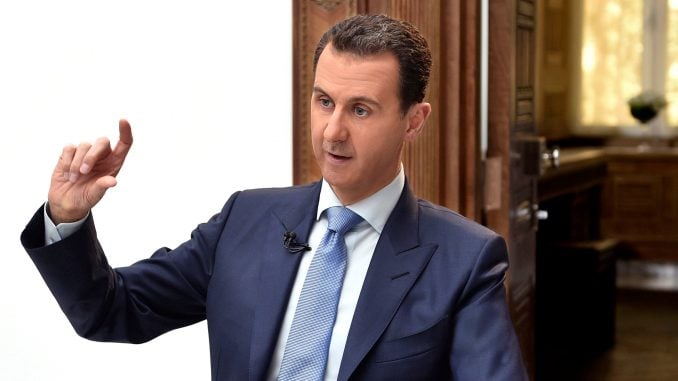
In the early hours of April 7, the U.S. military launched a series of missile strikes against an air base in northern Syria, in retaliation for the Syrian regime’s chemical weapons attack against civilians three days earlier.The strike shows that President Donald Trump is more willing to use military force in Syria than his predecessor. But it raises another crucial question: Why would Syrian President Bashar al-Assad, whose regime has consolidated control over Syria’s largest cities in the past year and put the rebels on the defensive, risk a new international backlash by using chemical weapons? If he’s winning, why would Assad take such a risk?The answer lies in Assad’s refusal to compromise or offer any significant concessions since the Syrian uprising now a civil war began in March 2011. Assad overplayed his hand this time, after being emboldened by recent statements from White House officials that it was time for Western powers to accept the “political reality” of Assad’s continued dominance. Assad did not expect Trump to respond militarily because the U.S. president has made it clear that he sees fighting Islamic State as his highest priority in Syria and Iraq.Aside from his brutality, Assad’s staying power is rooted in a convoluted foreign policy, pioneered by his father, Hafez al-Assad. Syria played the role of a regional broker and Arab nationalist standard-bearer since 1970, when the elder Assad seized power. He perfected the art of creating defensive alliances, nurturing proxies in neighboring countries and keeping his enemies stalled in costly battles.Since he rose to power after his father’s death in June 2000, the younger Assad learned to keep all of his options open and to play Syria’s friends and enemies off one another. To the West, Assad projected himself as the lesser evil compared to Islamic State and other jihadists.When popular protests first swept the Arab world in early 2011, the “axis of resistance” Iran, Syria, and the Islamist militant groups Hezbollah and Hamas boasted that the revolts had proven that they are the true representative of the majority of people in the Arab and Muslim worlds. In refusing to make substantial concessions, Assad has relied on another tactic he learned from his father: The Syrian regime does not make compromises under pressure, whether external or internal.Assad also saw the initial response to popular protests in Tunisia and Egypt, and he likely concluded that by not cracking down forcefully, those rulers appeared weak. So when his own people revolted, Assad decided to hunker down and crush the uprising.At the start of the rebellion in 2011, Assad used Islamic militants to destabilize his opponents. The Syrian regime released hundreds of al Qaeda activists and other militants from its prisons, and they went on to become leaders of Islamic State and other jihadist groups. Many of those militants ended up fighting Assad’s regime, but they also became the focus for Western leaders.Throughout the presidential campaign, Trump said he wanted to avoid direct U.S. involvement in Syria. After Trump was elected, Assad became more confident because Trump had pledged to end U.S. support for rebels fighting the Syrian regime and direct most American efforts to fighting Islamic State. Assad and his allies have rarely fought directly against the jihadist group, which established its self-proclaimed capital in the eastern city of Raqqa.Since November, the United States has helped mobilize nearly 50,000 Kurdish and Sunni Arab fighters to encircle Raqqa. The offensive is supported by American air strikes and hundreds of U.S. troops. But Trump’s missile strikes could slow the offensive to oust Islamic State from Raqqa and other parts of eastern Syria. The Pentagon coordinates with Russian forces in Syria, especially in launching air strikes, and Russian officials threatened to suspend the communications hotline after the April 7 U.S. attack.Assad has now suffered a setback because of the American attack, but Trump’s limited intervention is unlikely to change the course of the Syrian war and Assad will continue his scorched earth policy against rebels and civilians, even if he will now think twice about using chemical weapons.Mohamad Bazzi is a journalism professor at New York University and former Middle East bureau chief at Newsday.



